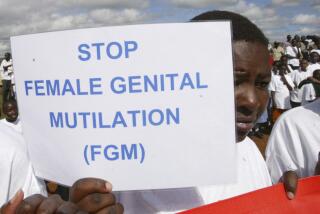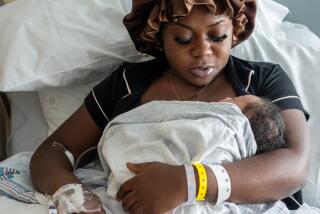Patients Embrace Culturally Sensitive Care
- Share via
BOSTON — John pulled his cab over when he heard Dr. Nawal M. Nour on the radio. The Sudanese American physician was describing the clinic she runs for women who have undergone female circumcision -- women like his wife, Miriam -- and John wanted to learn all he could.
“Other doctors, they didn’t know our culture,” said John, a Somali immigrant who did not want the family’s full name used. “Sometimes we felt, my wife and I, like people were looking at us differently. They know we are different, because of the circumcision. It looks to them like a surprise -- like ‘What has happened to this woman?’ ”
To Nour, 38, female genital mutilation, as she and many other critics refer to the practice, is repugnant, but by no means baffling.
It was her familiarity with the medical and social implications of this cultural tradition that led her to start this country’s only clinic dedicated largely to women who have undergone the procedure, in which all or part of the clitoris is removed. In the most radical forms of female circumcision, all external genitalia are removed. Nour launched the African Women’s Health Practice at Boston’s Brigham and Women’s Hospital in 1999, and last year won a MacArthur “genius” fellowship to help her continue the work.
According to the World Health Organization, about 140 million girls and women worldwide have either already undergone some form of female genital excision or will have before reaching adulthood. In the United States, Nour said, about 170,000 girls and women are “at risk” or have had the procedure, even though it was outlawed by Congress in 1997.
In Sudan, Nour said, “there was something that happened when I was younger to the girls I knew in Khartoum. Almost casually, they would say, ‘Oh, I got circumcised. Did you?’ ”
She did not. Nour’s American mother and her Sudanese father, a Cabinet minister, opposed the custom, the origins of which are murky. They saw no merit, Nour said, in the belief that circumcision made a daughter marriageable, helped promote a lifetime of cleanliness and stifled promiscuity by reducing sexual pleasure.
Nour went to high school in London, then to Brown University in Providence, R.I. She wrote her senior thesis on the emancipation of Egyptian women and, after graduation, went to work for the United Nations.
Later, with a medical degree from Harvard University, Nour’s fluency in Arabic became her calling card. Patients sought out the obstetrics and gynecology resident, who became known in the growing immigrant community here as “the African physician.”
Nour found herself increasingly involved in the lives of refugees from Ethiopia, Somalia, Sudan and other countries where female circumcision was common. She heard stories about African women in the United States who refused to seek medical treatment because doctors here either were horrified or turned the women into teaching objects.
“They came in with headaches, and they became guinea pigs,” Nour said. “Access to healthcare means feeling comfortable with your provider, so you can come back. In this case, we had completely blocked their access to healthcare.”
But when offered what she called “culturally competent” care, the women came back. From an initial patient base of fewer than a dozen women, Nour’s clinic roster surged in five years to almost 1,000 patient visits annually.
With more and more Africans settling in the United States, Nour said, she was determined to educate fellow physicians. According to the 2000 census, almost half a million people born in Africa entered the country between 1990 and 2000 -- double the number who arrived in the 1980s.
So Nour began offering workshops for healthcare providers, as well as classes for African women about parenting and medical practices in the United States. She taught the doctors about recurrent infections that plague many circumcised women. She explained why husbands generally accompany their wives to even routine office appointments. She also worked with a plastic surgeon to develop elective reconstructive techniques.
To the patients, Nour introduced the idea of breast exams, as well as annual checkups. She talked about “well visits,” prenatal care and menopause. “In Africa, you only go to the doctor when you are sick,” Nour said.
Although some of her colleagues “had to take some time to cope” when they encountered the most severe form of female circumcision, Nour said, many of the women told a different story.
“They will tell me that it is very beautiful,” she said. “If you talk to the majority of women who have been circumcised, they are leading healthy and productive lives, just as their mothers did.”
But Miriam, who came to the clinic with her husband and four young children, disagreed.
She was 7 years old when she was forcibly circumcised, said Miriam, now 34. And yes, it was painful. Although her family did not see it as a problem, Miriam said, she has found the extreme circumcision she went through hard to live with.
“It is a cultural thing. I do not know where they got it from, or why they do it,” John said. The couple said they would never subject their two daughters to any form of circumcision.
And Nour makes no secret of her own view of the practice. “I am going to do what I can to stop it.”
Since 1997, when then-Rep. Pat Schroeder (D-Colo.) shepherded a bill making female circumcision a federal crime, no documented cases have occurred in this country, Nour said.
“However, there is some suspicion that it may be occurring underground,” Nour said. “And there is increasing evidence that African families take their 6- to 12-year-old daughters [back to Africa] to be circumcised.”
Still, Nour is optimistic. “If you think about how foot-binding ended, it did actually stop overnight,” she said.
Recently married, Nour said she dreamed of starting her own family and one day moving back to Africa. She would like to make her clinic so much a part of the community that it basically runs itself.
More to Read
Sign up for Essential California
The most important California stories and recommendations in your inbox every morning.
You may occasionally receive promotional content from the Los Angeles Times.










